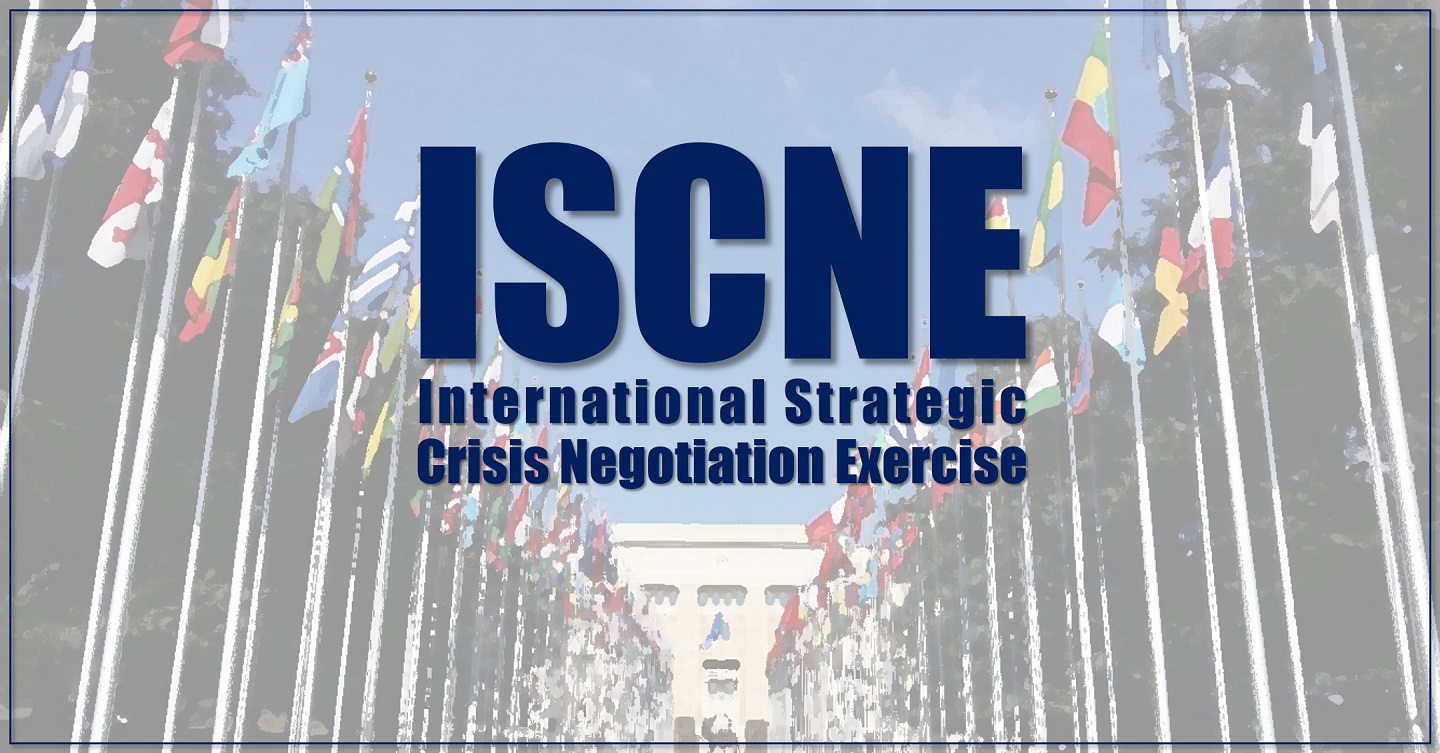
The U.S. Army War College is a vast repository of experience and expertise. Every day that knowledge is used to further develop joint officers and enlisted personnel along with many of their federal civilian counterparts. Every once in a while, the War College is able to share its development techniques and curriculum outside the gates of Carlisle Barracks. One of those instances is the International Strategic Crisis Negotiations Exercise (ISCNE) and on today’s episode Ed “Cliffy” Zukowski is in the virtual studio to explain the program. Cliffy joins Ken Gilliam in the latest installment of the WARGAMING ROOM to explain the value of the two-day strategic negotiation event and how he and the team take the show on the road to prominent universities. ISCNE is not only a great example of the DoD sharing knowledge but it’s a crucial part of the War College’s outreach mission.
Our biggest thing is outreach, to show a side of the military that these students have never seen, but also when they get into those positions of working in an embassy or maybe an NGO, the first time that they come in contact with the United States military, we don’t want that to be in a hostile situation or a situation where the military is being used.
Podcast: Download
Subscribe: Apple Podcasts | Spotify | Amazon Music | Android | Pandora | iHeartRadio | Blubrry | Podchaser | Podcast Index | TuneIn | Deezer | Youtube Music | RSS | Subscribe to A Better Peace: The War Room Podcast

Ed “Cliffy” Zukowski is the Director of the International Strategic Crisis Negotiation Exercise Program in the Center for Strategic Leadership at the U.S. Army War College. He is retired a Navy Commander and was previously on faculty at the War College. He can be contacted at edmund.zukowski@armywarcollege.edu. Ken Gilliam is a Colonel in the U.S. Army and the outgoing Director of Strategic Wargaming at the Center for Strategic Leadership, U.S. Army War College. The views expressed in this presentation are those of the speakers and do not necessarily reflect those of the U.S. Army War College, U.S. Army, or Department of Defense.
Photo Credit: Created by Ed Zukowski





Given such incidents as 9/11 (September 11, 2001), and 1/6 (January 6, 2021), today such things as “wargaming” and “international strategic crisis negotiations exercises” (etc.) these would seem to benefit from acknowledging a dynamic which appears to be (a) common to both these such events and (b) equally causative of same. This such dynamic being:
a. A resistance to the political, economic, social and/or value changes that
b. One’s government — in the name of such things as globalization and global capitalism — is now requiring of their populations.
In this regard, let us look at the observations of two individuals who have written about this such dynamic. First, consider the following from David Kilcullen’s “Counterinsurgency Redux:”
“Politically, in many cases today, the counter-insurgent represents revolutionary change, while the insurgent fights to preserve the status quo of ungoverned spaces, or to repel an occupier – a political relationship opposite to that envisaged in classical counter-insurgency. Pakistan’s campaign in Waziristan since 2003 exemplifies this. The enemy includes al-Qaeda-linked extremists and Taliban, but also local tribesmen fighting to preserve their traditional culture against twenty-first-century encroachment. The problem of weaning these fighters away from extremist sponsors, while simultaneously supporting modernisation, does somewhat resemble pacification in traditional counter-insurgency. But it also echoes colonial campaigns, and includes entirely new elements arising from the effects of globalisation.”
Next, let us look at this from the “Introduction” chapter to Robert Gilpin’s “The Challenge of Global Capitalism: The World Economy in the 21st Century:”
“Capitalism is the most successful wealth-creating economic system that the world has ever known; no other system, as the distinguished economist Joseph Schumpeter pointed out, has benefited ‘the common people’ as much. Capitalism, he observed, creates wealth through advancing continuously to every higher levels of productivity and technological sophistication; this process requires that the ‘old’ be destroyed before the ‘new’ can take over. … This process of ‘creative destruction,’ to use Schumpeter’s term, produces many winners but also many losers, at least in the short term, and poses a serious threat to traditional social values, beliefs, and institutions.”
Bottom Line Thought — Based on the Above:
If, standing directly before oneself, one finds a dynamic — such as the one that I describe above — which causes a similar negative reaction in both the developing and developed world —
Then should not this at exact such dynamic find some exceptionally prominent place in one’s “wargaming” and “international strategic crisis negotiations” (etc.) exercises?
Today — in both our foreign and domestic settings — what common circumstance might cause a crisis negotiation scenario to develop?
In this regard, let us consider two, fairly recent, historic events; these being, (a) 9/11 (Sep 11, 2001) and (b) 1/6 (Jan 6, 2021).
As relates to 9/11 above, one might suggest that the “root cause” of this such event was the U.S./the West’s foreign policies; which, for decades, had been focused on altering the ways of life, the ways of governance, the values, etc., of other states and societies (i.e., focused on further “developing”/further “modernizing” other states and societies); this, so that we — and they — might better provide for and better benefit from such things as globalization and the global economy.
As relates to 1/6 above, one might suggest that the “root cause” of this such event was the U.S./the West’s domestic policies; which, for decades, has been focused on altering — in this case — our very own way of life, our very own way of governance, our very own values, etc.; this, so that we here at home might better provide for and better benefit from such things as globalization and the global economy.
As one might surmise, from the information provided above, there are people that — in these such scenarios — (a) might get “ticked off” (get angry, annoyed, offended, etc.) at us and then (b) “come after us” in these such circumstances; these folks being (c) the more-conservative/the more-traditional elements of various populations who — in fact — (d) see themselves as the champions and the last-ditch defenders of their/our conservative/traditional ways of life.
Here, from David Kilcullen’s “Counterinsurgency Redux,” is an acknowledgement of this understanding; in this case, from the standpoint of conservative/traditional elements within the Greater Middle East:
“Politically, in many cases today, the counter-insurgent (to wit: our “partner” governments) represents revolutionary change (i.e., “modernization”/”development”), while the insurgent fights to preserve the status quo of ungoverned spaces, or to repel an occupier – a political relationship opposite to that envisaged in classical counter-insurgency (i.e., during the “wars of national liberation”). Pakistan’s campaign in Waziristan since 2003 exemplifies this. The enemy includes al-Qaeda-linked extremists and Taliban, but also local tribesmen fighting to preserve their traditional culture against twenty-first-century encroachment. The problem of weaning these fighters away from extremist sponsors, while simultaneously supporting modernisation, does somewhat resemble pacification in traditional counter-insurgency. But it also echoes colonial campaigns, and includes entirely new elements arising from the effects of globalisation.” (Items in parenthesis above are mine.)
And here, from our very own Heritage Foundation (and, in this case, from a domestic policy point of view) is what appears to be a similar understanding:
“Yet, the political left sees these very moments when the American people are overwhelmed and exhausted as opportunities to push its destructive agenda. It won’t stop promoting socialist climate policies, government-run health care, identity politics, racial division, bending a knee to our worst enemies and penalties for offending the sensibilities of the woke. As the threats continue to grow, Americans are feeling anxious. They’re worried about whether America will still look like America two years from now.” (See the article “A 2021 Rally Cry for Conservatives to Combat the Left’s Destructive Agenda” dated Dec 30th, 2020, by Kay C. James.)
(As we know, of course — until the election of Donald Trump — the American “Right” also supported both foreign and domestic policies designed to [a] alter our and other countries’ ways of life, etc.; these, so as to [b] better provide for and better benefit from such things as globalization and the global economy.)
Bottom Line Thought — Based on the Above:
Given the (“worldwide” it would seem?) “conflict environment/”conflict scenario” that I describe above (and its apparent “worldwide” significance?), should we not, accordingly:
a. Develop and field “crisis negotiations” (etc., etc., etc.)
b. Based on same?